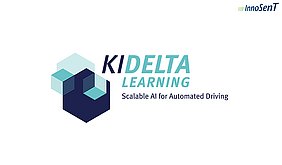AI is preparing autonomous driving for different environmental scenarios.
InnoSenT is part of the research project KI Delta Learning.
Donnersdorf (Germany) 01/12/2020.In January 2020, the funding project KI Delta Learning by the German Federal Ministry for Economic Affairs and Energy was launched as part of the VDA flagship Initiative for automated and networked driving. The aim of the project is to develop new methods and tools to meet the challenges of increasingly complex traffic conditions that differ from location to location. For this purpose, experts from the automotive industry are collaborating with reputable scientists.
Artificial intelligence (AI) is an important component of highly and fully automated vehicles. However, differences between user scenarios severely limit the applicability of the current generation of AI algorithms. These deltas place demands on the further development of AI for self-driving vehicles in series production and this project is meant to bridge them. Through the project, the high resource expenditures currently required for training and labelling neural networks are also to be reduced through new training procedures and organisation.
Only with the aid of methods to expand AI efficiently and without restrictions can autonomous driving become a reality in the ‘open world’. For this purpose, the project KI Delta Learning is researching methods of machine learning that would allow existing knowledge of a domain to be applied to new traffic conditions, referred to as the target domain, with little effort.
Using these methods, AI will in the future only have to learn the differences with unknown target domains – referred to as deltas – based on existing knowledge. These deltas can be divided into six use cases. This includes, for example, dealing with further developments in the field of vehicle sensors or with long-term changes in the traffic world such as a rising degree of networking and increasingly complex traffic situations.
The system also takes into account momentary changes, such as different times of the day or weather conditions, as well as the expanding the use of AI methods in other countries that utilise different traffic rules or streetscapes.
InnoSenT is contributing its many years of experience as one of the leading radar technology companies and is also supplying the vehicle radar sensors required for testing purposes. As a manufacturer and developer of radar-based driving assistance systems, the company boasts relevant expertise in the field of high-frequency circuit development and digital radar signal processing and is doing intense development work in the use of AI-based algorithms.
These are still relatively new for data preparation in the radar sector but show great potential. Artificial intelligence has already become established in the areas of vehicle classification and object tracking (high-level data processing). Now raw data processing (low level) is to benefit from the approach as well, in order to further improve detection reliability and resolution.
InnoSenT’s work in the KI Delta Learning project is focused on three main points: the development of a method for generating synthetic radar data, the application of this method in designing a development and test environment for AI-based radar signal processing, and the development of a delta learning method for adapting to different radar architectures.
The KI Delta Learning project is meant to make responses to new scenarios for the sensors in use more robust and to expand the vehicles’ area of use through more efficient data generation. This scalability, also known as autonomy at scale, also allows greater agility in reacting to new, future requirements in the development of highly automated vehicles and provides faster access to new markets. State-of-the-art technology is being advanced in all three areas in the funding project in order to equip the next generation of AI algorithms for unrestricted use in self-driving vehicles.
About the KI Delta Learning Project
- Running Time: 1. January 2020 – 31. December 2022, 36 Months
- Total budget: 26,96 Mio. EUR
- Funding Volume: 16,22 Mio. EUR
- Funder: BMWi
19 Partners:
Mercedes-Benz AG, BMW Group, Volkswagen AG, Robert Bosch GmbH, Hella Aglaia Mobile Vision GmbH, Valeo Schalter und Sensoren GmbH, ZF Friedrichshafen AG, CMORE Automotive GmbH, Deutsches Zentrum für Luft- und Raumfahrt e.V. (DLR), FZI Forschungszentrum Informatik, OFFIS e.V., Albert-Ludwigs-Universität Freiburg, Bergische Universität Wuppertal, Hochschule Reutlingen, Technische Universität München, Universität Stuttgart, Eberhard Karls Universität Tübingen, InnoSenT GmbH, Porsche Engineering Group GmbH
Project Management:
European Center for Information and Communication Technologies – EICT GmbH
PR Contact KI Delta Learning:
Valérie Hasler
On behalf of
European Center for Information and Communications Technologies – EICT GmbH
Tel: +49 162 1804016
Email: eict.de
www.ki-deltalearning.de
Words: 615
Publication only with acknowledgement of source and consent of InnoSenT GmbH. For printable images or more information about this topic feel free to contact the InnoSenT Company. InnoSenT GmbH is pleased to receive a voucher copy.
About InnoSenT GmbH
InnoSenT GmbH from Donnersdorf was founded in 1999 and is one of the world's leading companies in the field of radar technology. As a manufacturer and developer, the company supplies the full bandwidth of engineering services - from customer-specific development to series production. Thanks to the strong focus on quality and innovation, InnoSenT GmbH has been following a course to global success for many years.
More information can be found at www.InnoSenT.de







